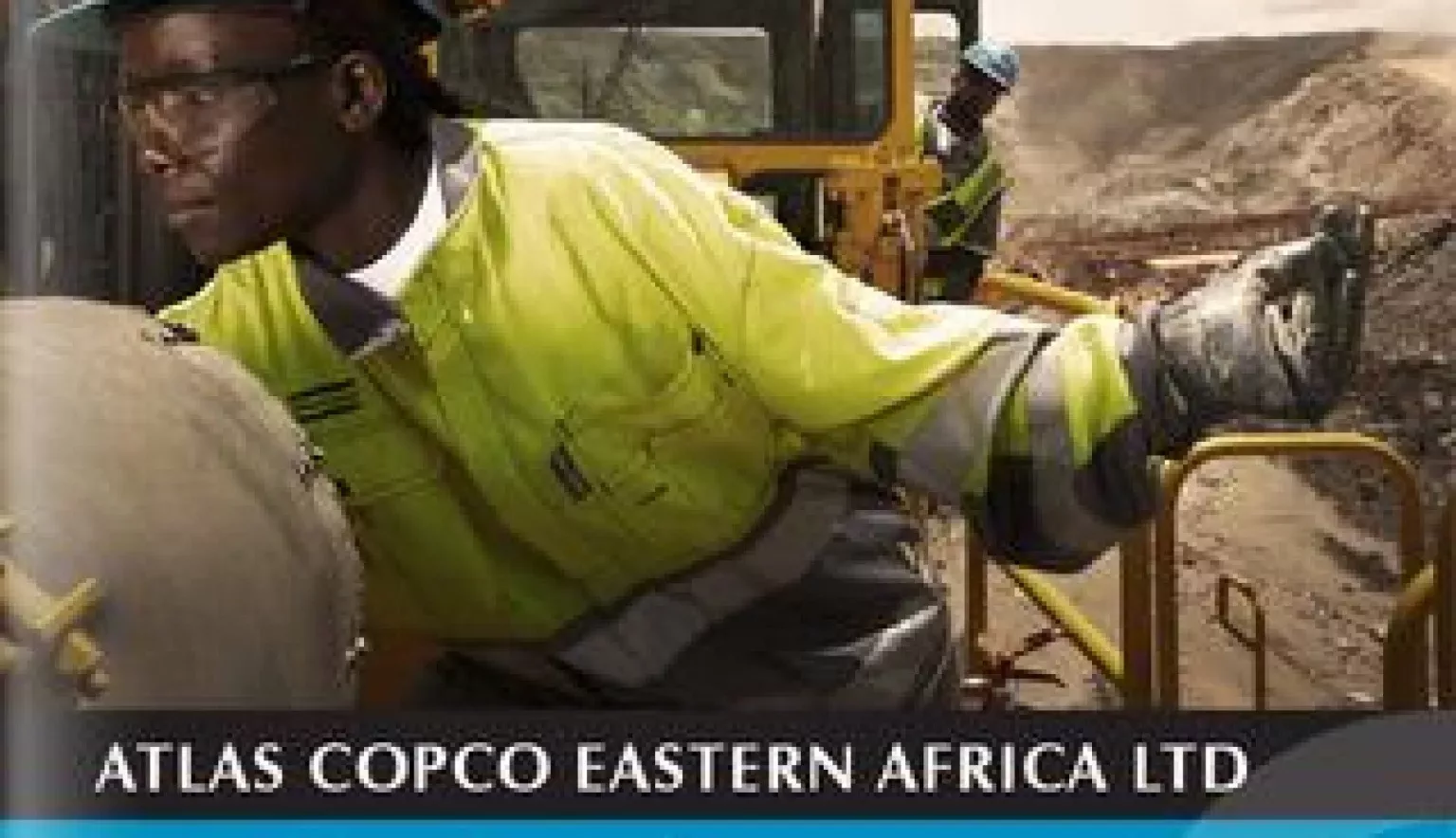The global influence of Atlas Copco has been complemented successfully by a strong local emphasis that incorporates activities in all 14 nations in Eastern Africa.
GLOBAL RESOURCES FOR LOCAL CUSTOMERS
Atlas Copco’s influence in Africa’s mining and construction industry is deeply rooted across all four corners of the continent, and none more so than in the eastern region as it continues to adapt, innovate and expand its offering to 14 countries.
Having opened its doors to the region in 1936 in Kenya, the subsidiary of the internationally renowned Atlas Copco Group has built a strong presence through its ability to diversify its products and services in line with different market and national requirements, to ensure that it remains as relevant and customer-focussed as possible.
The company’s longevity is now a major differentiator and selling point in garnering new business streams and attracting the best skills in the sector as it now looks to the next stage of its ongoing development and a concerted focus on optimising areas of human resources.
“We don’t have big problems retaining people, because of our age and our reputation as being part of the Atlas Copco Group,” says Country Manager, Lina Jorheden. “We may not be able to pay the highest salaries but we thrive in areas of safety and stability, while providing the opportunity for people to grow within the company thanks to the training and investment into people that we provide.”
ACTING LOCALLY
This ongoing dedication to internal sustainability and personnel development is replicated across its 14 countries of operation falling under the Eastern Africa umbrella; Kenya, Ethiopia, Tanzania, Eritrea, Uganda, Rwanda, Somalia, DRC, Sudan, South Sudan, Madagascar, Djibouti, Mauritius and Burundi.
In each of these nations, operations are tailored to specific industry trends and market requirements, covering an array of products and services including works in importation, distribution sales and aftermarket support for its extensive product range: industrial and portable compressors; generators; surface and underground mining equipment; drilling equipment for rocks, water wells and geotechnical functions; construction tools, equipment and rentals; and other industrial tools.
The success of Atlas Copco has not simply been in unveiling high levels of service across all these functions, however, but more in identifying where each product and service is most applicable, and at what specific times, and in line with country-specific regulations.
“For example, social, political and economic upheavals of the early ‘90s led to radical changes in fiscal policies and market liberalisation across the region,” Jorheden explains. “For Kenya, it was a decade of economic stagnation, while surrounding economies flourished.
“Atlas Copco Kenya Ltd recognised the potential for growth and re-entered markets in the wider Eastern Africa region; Ethiopia, Djibouti, Tanzania, Uganda, Sudan, Mauritius and Madagascar through direct contact as well as a comprehensive distributor network.”
Being an international company with the ability to act locally is imperative across such a vast and diverse regional footprint and has subsequently aided in bringing the organisation closer to customers; both in proximity and in understanding of what clients need.
This isn’t to say though that the same specialist Atlas Copco offering can’t be used across the board when suitable, as Jorheden adds: “We are able to share our resources and learn from their success in other countries to then use in new markets. We replicate the structure of our offering well into the region, including onsite support services, but of course there are different segments where we need to be a bit more specialised too.
“It’s also really important for us to work closely with our distributors in order to get close to our customers, so we can support them with our core Atlas Copco products, whether we have a local facility in that country or not.”
HR AND TRAINING
With the Atlas Copco brand engrained into the mining and construction fabric of Africa, and the company’s products and services recognised as being some of the leading industry offerings, the necessity to find a differentiator elsewhere has most recently led to a focus on human resources.
“The main investments we’ve made over the past year or more has been in HR and training,” confirms Jorheden. “We have of course upgraded our facilities as well, but this is not what’s making the difference.
“We have been working a lot with distributors on producing different workshops and finding more ways to get closer to customers, and we believe to ensure this, we need to have the right people and the right training in place.”
This strategy has incorporated pulling training programmes and business initiatives from the global Atlas Copco portfolio, and has provided a massive competitive advantage in East Africa.
Jorheden continues: “The way the market has developed, not everybody is able to achieve the necessary levels of good human resources, so we make sure that everyone within Atlas Copco is given responsibility and ownership over their own development, and this goes from technicians up to management level.
“Everyone receives a mission, and while they get all the support they need to complete the mission, it is important that we try to build their capabilities so they can take initiative and make decisions themselves. “
Skills development is further enhanced through leveraging the footprint that Atlas Copco Eastern Africa covers, transferring people across the different countries of operation; subsequently maintaining an all-important local impetus within the workforce while exposing them to different regional challenges and country-specific trends.
80 YEARS AND COUNTING
Finding the right balance between addressing regional considerations and acting as locally as possible, with infiltrating as much of the globally successful Atlas Copco brand into Eastern Africa as possible, is one that nearly 80 years of honing has helped greatly in achieving.
In regards to the latter, Atlas Copco Eastern Africa is currently complementing its wider human resources investments with a push into optimising sustainability and health and safety; both as part of a wider Group philosophy in recent years.
Being ISO certified for a number of years now, the subsidiary now takes these key areas into consideration with every new product, or every new negotiation with customers; knowing that the same importance on these issues is placed throughout the value chain.
Again, this commitment is flexible, in line with varying customer requirements, as Jorheden notes: “With health & safety and sustainability, there are different levels depending on different clients.
“Some of the larger mining companies, for instance, are well aware of the regulations that machines and personnel need to adhere to, so we work with them to make sure they have the right innovations in place to meet these expectations.
“Then on the other side, you might have smaller contractors who are not working in such a safe way and we then need to educate and explain how we can help raise these levels through our services.”
The ability to remain flexible and entrepreneurial is of paramount importance for reasons like these, across 14 different domains, but with so many decades of experience behind the company, everything is in place for the next 80 years of success in the dynamic region.
“Atlas Copco has such a broad portfolio and we have our combination of local emphasis with global resources that gives us a big competitive advantage,” Jorheden concludes.
“We’re sustainable in the region having been here for so many years, so while the market has changed a lot during that time, we’ve adapted our portfolio in line with that for the sake of our customers.
”For us, the main goal is to be close to our customers and to make sure that when it comes to new markets, we are already close enough to provide our main strength which is in aftermarket services. And, because the aftermarket is more stable and profitable than capital equipment sales, we know if we’re achieving that, then both Atlas Copco and our customers will be reaching their goals.”























